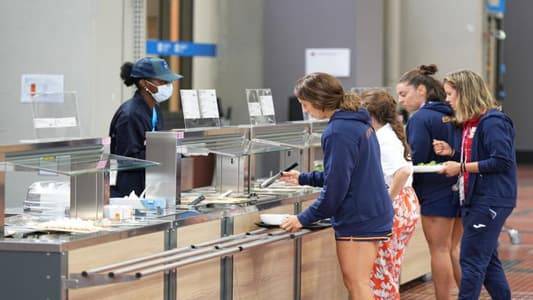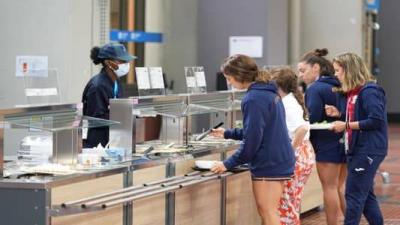Many athletes have expressed dissatisfaction with the quality of food and voiced their desire for more meat on the environmentally-friendly menus, despite France's promises to offer delicious dishes during the Olympics in the Paris Olympic Village. During a trial run at the Olympic Village restaurant in June, the head of the organizing committee for the games, Tony Estanguet, stated that Paris 2024 aims to reduce the average carbon emissions per meal by half compared to the previous Olympic Games in Tokyo (2021), by making 50 percent of the dishes plant-based. The organizing committee promised not to disappoint visitors to France and enlisted several Michelin-starred chefs as consultants to work alongside the French company "Sodexo," responsible for food provision.
However, the first few days in the village, located in the northern suburbs of Paris, saw a demand for more meat and eggs and larger quantities of food, which is crucial for athletes looking to replenish their energy after tough competitions or gym workouts. American gymnast Simone Biles expressed disappointment with the dining hall, which seats 3,300 and features six different dining areas offering meals from around the world. On Wednesday, she remarked, "It's not real French cuisine like the one you guys eat outside the village."
Hezly Rivera, 16, echoed her teammate's sentiments, stating, "I definitely think French food is good, but what we’re eating there, I don’t think it’s the best. But it serves its purpose." Italian runner Marcel Jacobs, the Olympic gold medalist in the 100m, described the village as "nice, but the food is not," while Jamaican Shericka Jackson, a two-time world champion in the 200m, agreed, saying, "The food is not good."
During a visit by Agence France-Presse to the bustling complex this week, many athletes reported initial difficulties with the menus, where 50 plant-based dishes were available each day at a 100 percent rate. Honduran swimmer Julio Horigo noted on Monday when asked about life in the village, "The only issue is the lack of food. It’s somewhat surprising." He confirmed that he consumes up to 5,000 calories a day and arrived for breakfast on Sunday to find only eggs left. At the entrance of the lively village, which accommodates about 10,500 athletes in roughly 40 low-rise towers, he stated, "If you arrive a bit late, there won’t be enough food."
Roman rower Iulian Chilaru gave a clear answer when asked if something was missing, saying, "Meat." He added, "We didn’t have enough meat, but the issue has now been resolved." For her part, Canadian beach volleyball player Sophie Bukovec said as she left the complex, "We enjoy vegetables, so it’s not a problem. Some athletes eat meat ravenously. They are trying to find a solution to this problem. There is protein; you just have to know where to find it."




